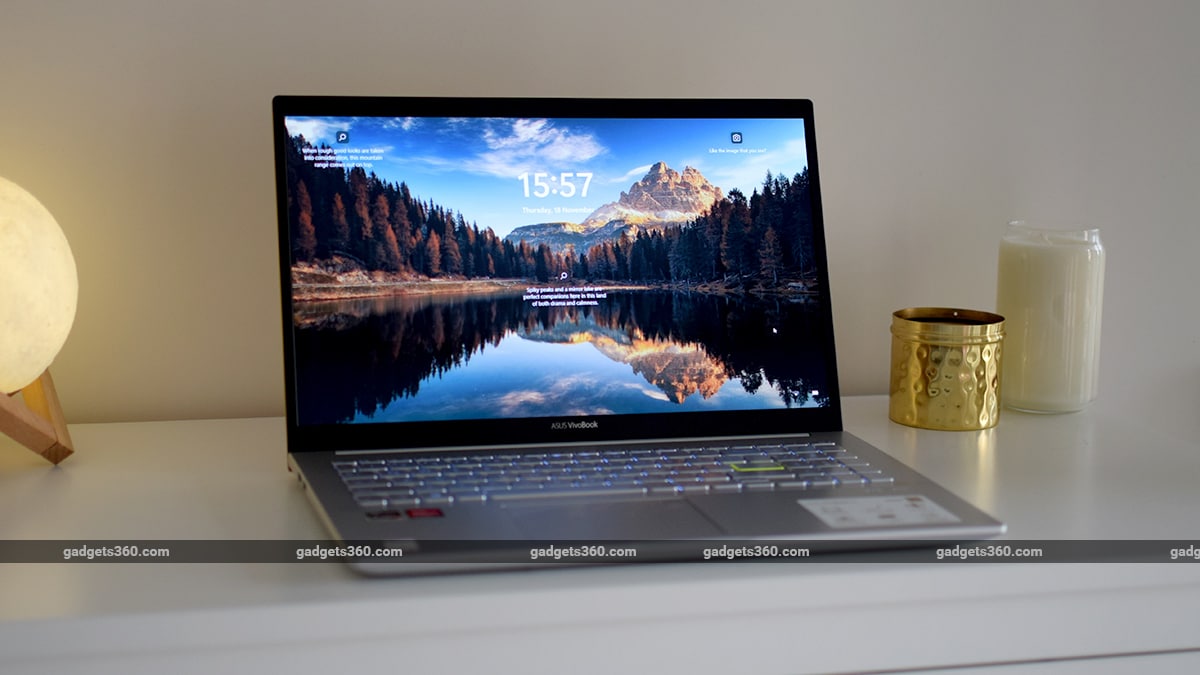
Multimedia laptops tend to hit the sweet spot between price and performance. Such devices generally offer high-quality displays for watching videos, are powerful enough for light gaming, and are relatively affordable. Asus’ Vivobook series has been following this trend, and today we’ll be taking a look at the new K15 OLED series, which is surprisingly very well priced.
The Asus Vivobook K15 OLED series pricing in India starts at around Rs. 47,000 and goes all the way to around Rs. 80,000. We’ll be testing a variant that falls somewhere in between, and features an AMD Ryzen CPU instead of Intel ones that most other variants have. With not a lot of other OLED laptops in this price segment, is the Asus Vivobook K15 OLED deserving of your attention? Let’s take a look.
Asus VivoBook K15 OLED (KM513) design
The Asus VivoBook K15 OLED has a large footprint due to the 15.6-inch display, but it’s not very thick or unwieldy. It is on the heavier side at 1.8kg, but this is not too bad for a laptop of this size. The build quality of the chassis is good, and the plastics have a good fit and finish, with no unwanted flex or creakes anywhere. Asus sent me a unit in the Hearty Gold finish, but this model should also be available in Indie Black and Transparent Silver.
![]()
The OLED display is the main attraction of the Asus VivoBook K15 OLED
The main attraction is the OLED display. This 15.6-inch screen has a full-HD resolution, 600nit peak brightness, and 100 percent DCI-P3 colour gamut support. The display also carries certifications from Pantone, TUV Rheinland, and others for things like colour accuracy and low blue-light emission. The Asus Vivobook K15 OLED has narrow borders on the left and right of the display, and slightly thicker ones on the top and bottom. There’s an integrated webcam above the screen but it only has a 720p resolution. The lid offers decent protection for the OLED panel, and even though there’s a bit of flex, this doesn’t visibly affect the display.
One of the big advantages of a 15.6-inch laptop is you have the luxury of a full-sized keyboard with a number pad. I needed to recalibrate my muscle memory a bit coming from a smaller laptop, as I kept hitting the wrong keys initially, but I got used to this after a couple of days. The keys themselves are well spaced and comfortable, but I wish they had been slightly sculpted and not flat, for a better typing experience. The ‘Enter’ key has fluorescent green highlights, which is a fun little touch. The arrow keys are well spaced too. The Asus VivoBook K15 OLED has a fingerprint sensor placed in one corner of the trackpad. It works well and doesn’t get in the way.
![]()
The Asus VivoBook 15 OLED features a full-sized keyboard
Coming to the ports, you get plenty of them. On the left side, you get two USB 2.0 Type-A ports and on the right, there’s a USB 3.2 Gen1 Type-A port, a USB 3.2 Gen1 Type-C port, HDMI 1.4 video output, a headphone jack, a DC power inlet, and a microSD card slot. For everyday use, these ports should do just fine, although I would have preferred more USB 3.0 ports instead of the two USB 2.0 ports, and HDMI 2.0 instead of the older v1.4 spec would have allowed for output at 4K 60fps.
I also don’t understand why Asus went with a microSD card slot instead of a standard-sized one, especially since there should be ample space on a 15.6-inch laptop. You can’t charge the laptop via the Type-C port, and none of the USB ports will supply power to charge other devices if the laptop is off. This may sound like I’m nitpicking, but it’s the little conveniences that make a big difference to everyday use.
Asus VivoBook K15 OLED (KM513) specifications and software
The Asus VivoBook K15 OLED is available with either an Intel or AMD CPU. The Intel-based variants start at Rs. 46,990, and at this price you’d get an 11th Gen Intel Core i3-1115G4 CPU. You can go all the way to a Core i7 if needed. At the time of this review, Asus only has a single AMD-powered variant on sale in India, which features an AMD Ryzen 5 5500U CPU with integrated Radeon graphics. This variant also has 8GB of RAM, a 256GB M.2 NVMe SSD, and a 1TB mechanical hard drive. Out of the 8GB of RAM, only a single 4GB module was detected in the CPUz app, which means the other 4GB is most likely soldered onto the motherboard.
![]()
The MyAsus app offers quite a few customisation options
My unit shipped with Windows 10 but you can opt to upgrade to Windows 11 while setting it up. Some of the preinstalled programs include a trial version of McAfee Livesafe and a fully licensed version of Microsoft Office Home & Student 2019. All of Asus’ programs can be found through the MyAsus launcher app, for which there’s a dedicated shortcut button on the keyboard too. The app is a little clunky but functional, and offers loads of options for battery care, updates, and display settings.
There’s an OLED Care section here too, which has options for a special screen saver that can be activated if the laptop is idling on a static screen for too long, and a Pixel Shift feature to avoid screen burn-in issues. These are enabled by default to protect the OLED display in the long run. Another feature that I liked is the ability to toggle the primary functions of the Fn row keys.
Asus VivoBook K15 OLED (KM513) performance and battery life
The Asus VivoBook K15 OLED excels at video playback thanks to the vibrant OLED screen. Blacks are deep and colours can look very vivid, depending on how you tweak the display. The glossy screen can cause reflections, which is something to keep in mind. Viewing angles are good but there is a slight colour shift when viewing the screen off-axis, although this is only really evident with a white background.
The display does support HDR, but to use it, you need to enable this setting in Windows. The default picture profile is pretty bad, as any highlight in an HDR video gets instantly blown out. You’ll need to adjust the HDR brightness slider in Windows’ display settings to find the right balance, and also enable HDR streaming while running on battery power. After doing this, HDR videos looked much better. The stereo speakers sound decent but not great, even with the DTS app enhancements.
![]()
There’s a decent selection of ports but a full-sized SD card slot would have been preferable
Windows 11 ran very well on the configuration of the Asus VivoBook K15 that I tested. Programs were quick to open and close, waking the laptop from sleep was speedy, and the fingerprint sensor worked well for authentication. The white backlight on the silver keys make their labels tricky to see in the day, but does its job in low light. The laptop performed well in benchmarks too, returning good numbers in synthetic tests.
The Ryzen 5 5500U CPU was only slightly behind the Ryzen 5 5600U that we recently tested in the Acer Swift X, which made sense. However, the integrated Radeon GPU isn’t powerful enough for demanding games. Fortnite was only playable at low graphics settings at the display’s native resolution. Games such as Far Cry 5 were only just about playable at low graphics quality, and here, the resolution had to be reduced too.
![]()
The bright and vivid display of the Asus VivoBook 15 OLED makes it ideal for binge-watching movies
The Asus VivoBook K15 OLED has a modest 42WHr 3-cell battery, which lasts for about four hours with light to medium use and the Windows battery profile set to ‘Balanced’. This kind of battery life isnot great, especially for a 15.6-inch laptop. With the laptop in ‘Better power efficiency’ mode, I was able to squeeze out another hour with similar usage, which is still not much. It would have been nice to have had a larger battery given the size of the chassis, even at the cost of the laptop being a little heavier.
Verdict
The Asus VivoBook K15 OLED (KM513) is an excellent laptop for media consumption and is relatively slim and light for a 15.6-inch screen size. The six-core Ryzen 5 CPU offers plenty of power for multitasking and demanding workloads. Gaming is not this laptop’s strong suit, which means you’ll have to look at other options if this is a priority for you. Battery life is a little disappointing and I wish Asus had provided a full-sized card slot instead of a microSD slot.
[ad_2]
Source link






